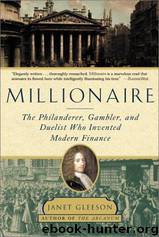Millionaire: The Philanderer, Gambler, and Duelist Who Invented Modern Finance by Janet Gleeson

Author:Janet Gleeson
Language: eng
Format: mobi, epub
Tags: Autobiography, Trade and Finance, Paper Ephemera, Banks & Banking, Biography: business & industry, Finance, Business, Antiques & Collectibles, Entrepreneurship, Biography: historical, Historical - General, Economics, Biography: General, Historical, General & world history, Business & Economics, History, Modern, Capitalists and financiers, General, Biography & Autobiography, Modern history to 20th century: c 1700 to c 1900, Biography
ISBN: 9780684872964
Publisher: Simon & Schuster
Published: 2001-07-15T10:33:38.160000+00:00
The Crown of Poland, venal twice an age,
To just three millions stinted modest Gage.
But in certain Parisian salons the flourishing fortunes of countless overseas investors met with a chilly reception. Why, many asked, should foreigners profit when many French were unable to buy as many shares as they would have liked? What right had Law to help English investors at their expense? “Some of the French have endeavoured to represent to Mr. Law’s prejudice the great gains they pretend his countrymen have made,” the diplomat Daniel Pulteney observed. Law ignored the faultfinders. In reality, nostalgia for the land of his birth had nothing to do with it: he encouraged outside investors because he recognized that to play the markets they brought with them silver and gold currency, without which the system of paper money could not survive.
While the holiday mood continued, the foundation of the fabulous gains remained unquestioned. Shrouded in the mists of inexperience, speculators of the rue Quincampoix had no yardstick against which to measure their experience. Almost a century earlier, in the 1630s, speculation fever had descended on Holland when the price of tulips and futures contracts for bulbs had bubbled and burst—the now notorious Tulipmania. But though shares had long been available, investors had been largely confined to small, select groups. The wider general public had never before taken part, nor had such rapid rises on such a scale ever been witnessed. Like gluttons at a Mississippi banquet, most investors ingenuously accepted the opportunity to gorge themselves and never considered the consequence. The fact that the huge increase in share prices was founded on little more than hype and the hugely expanded money supply was unthinkingly brushed aside.
The quantities of notes that had been circulated were vast indeed. Estimates differ—there are no precise figures, because all records were burned in the aftermath of the Mississippi—but one assessment generally accepted by scholars puts the figure at over 1.2 billion livres’ worth by the end of 1719. Added to this, the 624,000 shares that had been issued at 221 million livres were, on current market valuations at the end of November 1719, worth 4.8 billion livres. Of these the Crown and the company probably owned a third. France, thanks to Law’s magic system, was now richer to the tune of 5.2 billion livres. The regent himself had earned a fortune, which he circulated liberally to his paramours and favorites, and Law believed himself “the richest subject in Europe.” But the question of what underpinned these paper fortunes had been dangerously ignored.
The share price had been boosted on its upward path by the ease with which money could be borrowed from the bank. Loans at 2 percent interest were readily available and shares could be used as collateral. The eighteenth-century economist Du Tot summed it up: “Law,” he said, “had built a seven-storey building on foundations that would support only three.” Now we would call it a bubble. As the autumn of 1719 yielded to winter, share prices scaled
Download
Millionaire: The Philanderer, Gambler, and Duelist Who Invented Modern Finance by Janet Gleeson.epub
This site does not store any files on its server. We only index and link to content provided by other sites. Please contact the content providers to delete copyright contents if any and email us, we'll remove relevant links or contents immediately.
| Non-Sports Cards | Paper Ephemera |
| Postcards |
How to Be a Bawse: A Guide to Conquering Life by Lilly Singh(6860)
Spare by Prince Harry The Duke of Sussex(4411)
Millionaire: The Philanderer, Gambler, and Duelist Who Invented Modern Finance by Janet Gleeson(3736)
Harry Potter 02 & The Chamber Of Secrets (Illustrated) by J.K. Rowling(3353)
Never by Ken Follett(3139)
The Heroin Diaries by Nikki Sixx(3066)
Urban Outlaw by Magnus Walker(3046)
Harry Potter and the Prisoner of Azkaban (Book 3) by J. K. Rowling(2882)
Japanese Design by Patricia J. Graham(2683)
The Club by A.L. Brooks(2511)
The Man Who Died Twice by Richard Osman(2503)
Machine Learning at Scale with H2O by Gregory Keys | David Whiting(2502)
Stacked Decks by The Rotenberg Collection(2386)
Fairy Tale by Stephen King(2386)
Harry Potter and the Deathly Hallows (7) by J.K. Rowling(2300)
Will by Will Smith(2249)
Churchill by Paul Johnson(2104)
The Chimp Paradox by Peters Dr Steve(1977)
The 7 Habits of Highly Effective People: Powerful Lessons in Personal Change (25th Anniversary Edition) by Covey Stephen R(1924)
